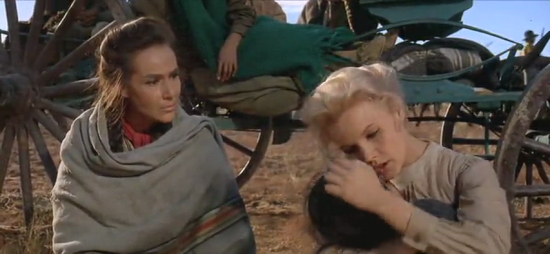
It's such a shame so many filmmakers in the
late 50s and early 60s had to overdevelop consciences. That's the main problem
with John Ford's 1964 film Cheyenne
Autumn. Or maybe it was simply the folly of using a morally
muddy historical event for a feature length apology for the way Native
Americans had traditionally been portrayed in American cinema. It's frequently
a beautiful film to look at and a brief subplot involving James Stewart as Wyatt
Earp is entertaining, though out of place. Ford fails in creating the morally sharp
sermon he set out to make--achieving instead a simplistic tale far inferior to
the metaphysical battle between America's two hearts in The Man Who
Shot Liberty Valance or the frightening, human ambiguity of
The Searchers.
Part of the problem is that in attempting
to humanise the Cheyenne Ford felt nonetheless compelled to cast non-north Native
American actors in the lead Native American roles--a broad and ineffective
Ricardo Montalban as one of the chiefs, Little Wolf, and Dolores del Rio cast
somewhat cheekily in the role of a Cheyenne
woman named Spanish Woman.

Ford also felt it necessary to include a
blonde Quaker woman (Carroll Baker) to provide the audience with a point of
empathy among the Cheyenne.
The movie tells the story of the Northern
Cheyenne Exodus, an incident in 1877
when a few hundred Cheyenne decided to leave
their reservation and return to their ancestral homeland near Yellowstone.

It's an ensemble film but the closest
character to a central protagonist is Captain Thomas Archer played by Richard
Widmark who, in this context, made me realise how much he sounds like John
Wayne. But he does a great job in his own right, the steely empathetic person
Ford needed for the role. He feels bad for the starving Cheyenne but is also willing to shoot back if
they shoot at him.
John Wayne's son Patrick plays Archer's
Lieutenant Scott, still kind of a pipsqueak despite being twenty five at this
point. Maybe it was hard carving out a niche of masculinity with his father in
the house throwing his gut around.

He leads a charge against Cheyenne at one point in the film in one of
the many brilliantly choreographed sequences. In regards to choreography and
composition--including in his signature location of Monument Valley--Ford
is in top form.

The episode with Stewart as Wyatt Earp is
also entertaining, as I said, though Ford may have been better off creating his
own character rather than trying to tie Stewart's part to an historical figure.
Stewart's character in The Man Who Shot Liberty Valance, the
man from the East trying to tame the West with the letter and spirit of the
law, embodied so much more by being Ford's fantasy. But Earp has an amusing
plot in Cheyenne Autumn about a prostitute acquaintance of
his.
The other great supporting performance is
Edward G. Robinson as Secretary of the Interior Carl Schurz though his presence
also drags the film down in two ways. For one, I was pleased with how little
Ford relied on soundstages for outdoor scenes, unlike in his later film
7 Women which was severely diminished by being shot almost
entirely indoors. But the one crucial scene which features Robinson outdoors
features a distracting rear projection.

But Robinson was seventy years old at this
point so I suspect there may have been health issues related to his inability
to go on location. The more disappointing aspect of his character is that
there's no mention of the fact that the historical Carl Schurz was born and
educated in Germany
and fought in the German Revolution. Part of the reason this is so
disappointing is that Karl Malden plays Captain Oscar Wessels, an officer in
the American army who is shown to be personally responsible for the worst of the
hardships the Cheyenne
endure. He's portrayed as a stereotype of a Nazi soldier, having sympathy at
first for the Native Americans but totally reversing his feelings to fall in
line with orders he's given to restrain the Cheyenne. Schurz in the film is shown as a
great advocate for Native American civil rights.

But here we are in the pointless pursuit of
apportioning the just quantities of good and evil in different races and
peoples. One can see Ford was probably using the German as a place to divert
the racial hatred audiences might have customarily spent on the Native
Americans. The solution to Ford's problem was simpler than that--it's a shame
he didn't see it; just write all the characters as people.
Twitter Sonnet #596
Tetherball pendulums licked the
lightweight.
Silver bricks held aloft stun outer space.
Sugared question marks make ready fish
bait.
Granite oil carves a boiling face.
Blue banks fire from the busy sea lane.
Airbags quickly choke the emergency.
Wire clouds keep a powerless airplane.
Yellow Lego knobs bespeak vacancy.
Anakin confused critic Isolde's draught.
Lovely murk falls on television hill.
Oingo Boingo echoes in the lift shaft.
A breakfast ballet blocks an evening will.
Platinum fire flares from molasses.
The doughnut compass points to
Colossus.

No comments:
Post a Comment